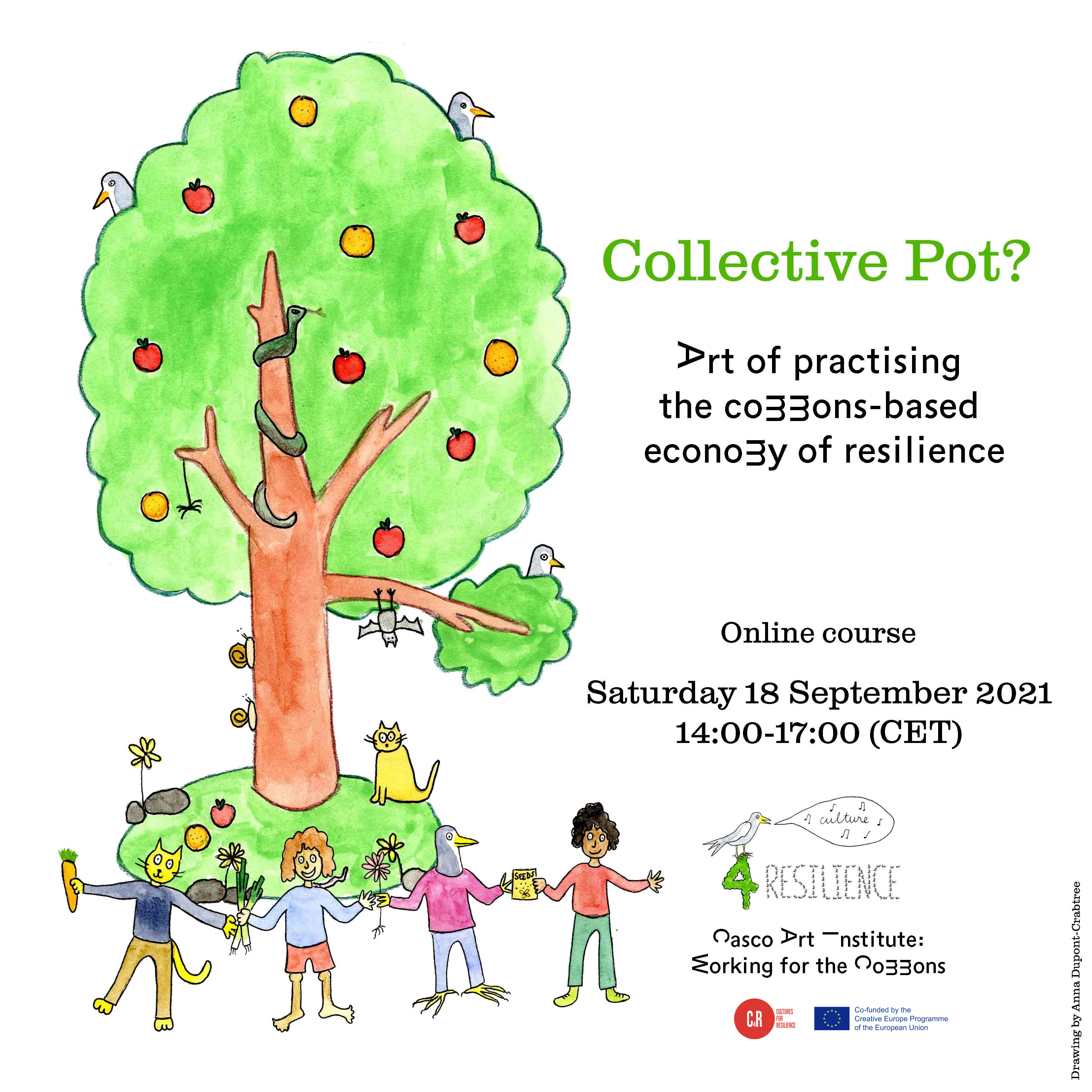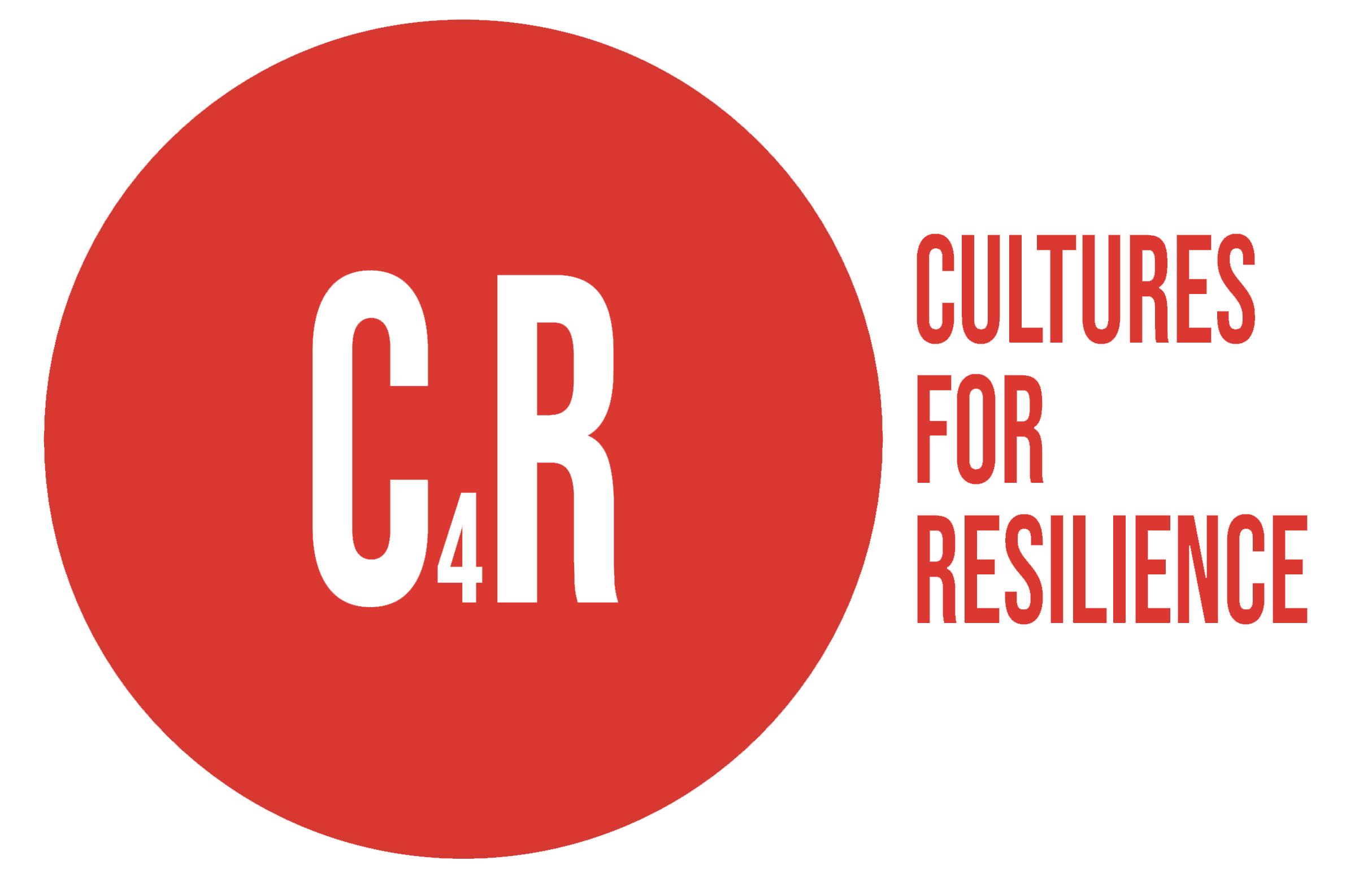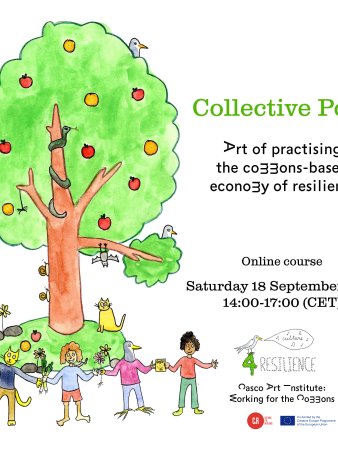Collective Pot? Art of practicing the commons-based economy of resilience
Online course
Saturday 18 September 2021, 14:00-17:00 (CET)
To get involved, please register here!
Over the last decades, economic inequality and insecurity have only increased. There’s the financial capitalist economy as the key operator for this phenomenon. It abstracts value away from material worlds, use and sustainability, while simultaneously watering down the collective spirit. The field of art is not free from this systemic condition. One might say it has been functioning rather as an exemplary model of the capitalist economy through its emphasis on individual autonomy and its unregulated, fluctuating market values, disregarding materiality and labor in the process. However, there are also those who wish to change these cogs of the art world, taking back the economy with art at heart. These economic transformations are based on values relating to the commons, such as diversity, equity, pluralism, and sustainability, thus creating the conditions for a culture of resilience – one that resists, repairs and regenerates.
Collective Pot? Art of practicing the commons-based economy of resilience is an online pilot course organized by Casco Art Institute within the framework of C4R. This course features artists, artistic collectives and other practitioners who will offer guidance to use and adapt relevant tools for a resilient economy. Currently we have assembled four tools for close workshops. We recommend this course to those who seek to liberate themselves from individual survivalism and sole dependency on money and its accumulation. Not only does this course focus on the use of the tools – it is also a forum to discuss and co-develop them together. Via Collective Pot?, we aim to support the participants, equip them with necessary skills as well as embody the culture of the commons in “concrete engagement” (Friction. A. Tsing, p. 267) with their lived cases.
Please find more information on the course with the introduction to the tools and workshops, and how to get involved below.
The working language of the course will be English and features captioning throughout.
List of four tools and workshops
The course consists of four workshops each of which focuses on a specific tool for the commons based economy of resilience with art at heart. The following are the teasers for each tool.
More information on the tools, being updated over time, are available on the OpenTools section on the C4R digital platform. The platform is built on the resilient technological methods and takes on such mode of operation as set up and managed by one of the C4R partners, NetHood (Zurich).
Rojava Film Commune by Rojava Film Commune, channeled by Sevinaz Evdike
Rojava is more than a region located in the Northern and Eastern Syria. It is an autonomous government established in 2014 while surviving what’s often referred as the Syrian war ridden with geopolitical complication. It’s based on the radical democratic principle whereby key values such as cooperativism, diversity, women, ecology rule. The film commune is one of many communes that form the basis of Rojava governance.
“Rojava aspires to a nonhierarchical and directly democratic system; its political structure is rooted in small, local assemblies in which decisions are discussed and agreed on collectively. Although private property has not been abolished, segments of agriculture and industry are cooperatively held. In this same spirit, the Rojava Film Commune was founded in 2015 as a collective dedicated to the production, distribution, and reception of films depicting and documenting the stateless society of Rojava, Kurdish and Arab culture, and the region’s continuing military and ideological struggles.” (from: https://www.artforum.com/print/202007/alan-gilbert-on-the-rojava-film-commune-83689
Especially Sevinaz Evdike, one of the Commune’s members will focus on what enables them to operate with minimal reliance on money, the importance of cultural, ideological and spiritual practices enabling their cooperative, autonomous models of governance.
Art for Universal Basic Income by Institute of Radical Imagination, channeled by Mao Mollona, Marco Baravalle and Emanuele Braga**
“While the art market confirms his status as a safe-haven assets provider for the financial elite, the current pandemic has highlighted the fragility and precarity of art workers around the world, a condition common to a growing portion of humanity. In this situation a UBI (Universal Basic Income) would then represent a solution and indeed an urgent measure to implement. But UBI is not “only” a response to poverty, it is a necessary condition in order to rethink our extractivist ecological model, to correct many race and gender asymmetries and, last but not least, to change the art world’s present neoliberal structure. UBI must be seen as a tool to open up new subjective spaces, alternative to the dominating entrepreneurial individualism and focused instead on commons and care” (from https://instituteofradicalimagination.org/the-school-of-mutation-2020/som-iterations/art-for-ubi/)
Method of valuing the commons by atelier d’architecture autogérée
R-Urban is a project run by atelier d'architecture autogérée based on networks of urban commons and collective hubs supporting civic resilience practices at the outskirts of Paris. Around 2015-6, one of the hubs was evicted from its site by the municipal administration that could not see the value of an “urban farm” compared to a parking lot. Prompted by this event, aaa took an initiative to account the value of resilient, ecological, citizen led initiatives.
“Our value accounting gives visibility to what usually is invisible and uncounted—that is, voluntary unpaid labour, environmental care services, everyday ecological practices, and well-being improvements.This hidden value is normally appropriated by the state or the market for free (Bollier, 2016a, p. 30)” from the article “Calculating the value of the commons: Generating resilient urban futures”
AAA, our partner for C4R experimented and will share with you an accounting method for the commons based activities which often defy known forms of transaction such as wage. This method is realized in collaboration with Katherin Gibson who’s a leading scholar in theorising and promoting “community economies”.
Open Collective.com by Open Collective, channeled by Caroline Woolard & Pia Mancini
Caroline Woolard, artist and one of our close interlocutors these days, recently joined the Open Collective Foundation as Director of Research & Partnership, and will guide you to the Open Collective tool together with one of the founders, Pia Mancini.
“Open Collective Foundation is creating a legal, financial, and technical commons for the solidarity economy. OCF has a unique role to play as steward of a legal, financial, and technical commons—a piece of shared infrastructure—that is resonating deeply with the solidarity economy movement. We can build bridges between 501(c)(3) fiscal sponsorship, the open source community (where we have deep roots), mutual aid groups (100+ are hosted by OCF today), and the movement at large.
A new clarity has emerged for Open Collective Foundation: Solidarity will be our guiding principle.”
How to get involved?
We recommend you to get acquainted with each of the four tools before choosing one – for which you can attend a close workshop by the artists and art collectives offering the tool. Please also note the information and supportive documents for the tool continues to be updated on the C4R website.
What enables a community to operate with minimal reliance on money? The Rojava Film Commune works for the production, distribution, and reception of films depicting and documenting the stateless society of Rojava, Kurdish and Arab culture, and the region’s continuing military and ideological struggles.
How can artists organize against the increasing inequality amplified by the pandemic conditions globally? Art for Universal Basic Income – a campaign initiated by artists – is converging energies with movements across the world challenging the market’s current modes of exploitation.
What shape can the infrastructure for the solidarity economy take? The Open Collective is working to build legal, financial, and technical tools which are open source and transparent – enabling connections between financial institutions, cooperatives, mutual aid groups and non-profit organizations.
How is an evaluation method of a commons site created to counter the conventional value applied to it by governing bodies and decision makers? AAA builds on the ongoing tradition of the Community Economies framework and its iceberg iconography. By doing so, they offer a tool that can be adapted, re-applied and become an ally to groups, communities and commoners to visibilize what remains conveniently hidden or unaccounted for ‘in the eyes’ of the market and the government when decisions on such commons sites take place.
Each workshop will take place simultaneously on the same date. There will be plenary sessions before and after the workshop to get further impressions on the other tools and relate to fellow participants. Find the detailed program below.
Saturday, 18 September, 14:00 – 17:00 (CET)
Online course
Welcome and Introduction to the project and the online course
14:00 - 14:30
Four close workshops of the four tools
14:30 - 16:00
Plenary session and Q&A
16:00 - 17:00
Registration to the course is possible by filling this form. The registration and participation fee is suggested in sliding scales. Our intention is to accommodate 15 participants for each workshop, in order to allow the necessary interactions. The registration will be closed as we reach this capacity. Please contact Marianna Takou (marianna@casco.art) for any further inquiry.


